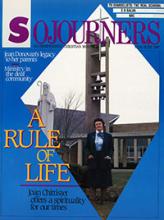It's morning in America. Our long national daydream is over. The worm, so to speak, has turned. The Reagan era is history. The evidence is as plain as the nose on your face and the faces on your television.
The last year has seen a 180-degree shift in public iconography. The strong, silent Rambo is supplanted by Oliver North, the Mute Marine. The romance of the entrepeneur, symbolized by Lovable Lee Iacocca, is replaced by revulsion at the greedy thievery of Ivan Boesky. The warm glow of "family values" and "spiritual renewal," the velvet glove on the New Right fist, dissipates as the corruption of PTL--and the meanness of PTL nemesis Jimmy Swaggart--comes to the fore. Our boys in uniform, last seen storming the med schools and mental wards of Grenada to public adulation, now turn up in Moscow handing over the government's most closely guarded secrets in exchange for what boys' room graffiti would call "a good time."
Obviously these various examples of decadence and disillusion are not all related. But in the calculus of popular consciousness, they all add up. Even Time magazine, the ultimate arbiter of conventional wisdom, can now discern what its March 30 cover line called "A Change in the Weather." In the cover story, "America's Agenda After Reagan," Time's resident thinker of deep thoughts, Lance Morrow, tells us that in the post-Reagan backwash, "compassion" is again becoming fashionable. As evidence he cited polling data showing that more than 70 percent of the American people favor increased government spending on health care for the elderly and poor, aid to the homeless, and environmental protection.
Read the Full Article

